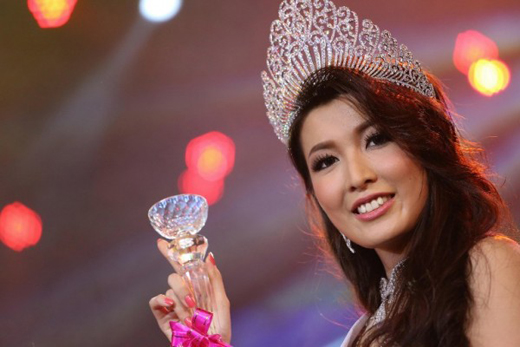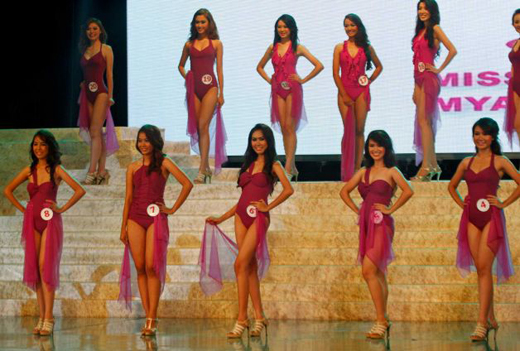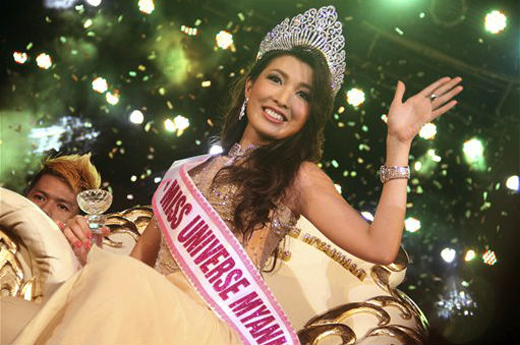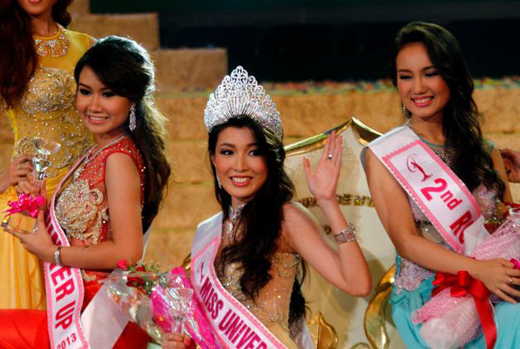Myanmar picks first Miss Universe hopeful in half-century
Myanmar picks first Miss Universe hopeful in half-century
mangaloretoday.com
Myanmar, Oct 4: Moe Set Wine, 25, holds her trophy after being chosen as Myanmar’s contestant in the Miss Universe during a pageant in Yangon on Sunday.
YANGON—With a whiff of controversy and not a bikini in sight, a US-educated business graduate was selected as the first Miss Universe contestant to represent Myanmar in more than 50 years.

Moe Set Wine will take her place on stage at the global beauty pageant in Moscow next month, reflecting dramatic political and social changes in the former junta-ruled nation which last fielded a Miss Universe contender in 1961.
“I feel like now I am part of the history and I feel like a soldier that is doing something for the country and my people,” she said after winning the trophy late on Thursday.


“I’m still in shock. I still can’t believe it. I feel really happy, because now I get the chance to represent my country,” added the 25-year-old, who has a BA in business marketing from California Lutheran University.
According to the contest website, Moe Set Wine’s ambition is to “obtain self-accomplishment and be able to help/give the people in need.”
Hemlines are rising in the nation formerly known as Burma as it opens up to the world after decades of iron-fisted military rule ended in 2011.

President Thein Sein’s quasi-civilian government has released hundreds of political prisoners, welcomed Nobel Peace Laureate Aung San Suu Kyi and her National League for Democracy party into parliament and scrapped draconian censorship measures.
But while many young people are embracing the fashion revolution, not everyone approves of scanty dress.
When racy shots of one model wearing a two-piece swimsuit appeared online a few years ago, she received abuse and threats.
So the Miss Universe hopefuls were careful not to bare any midriff in the swimsuit section, while long dresses were the garment of choice elsewhere in the show.
“My personal view is that the competition presents a good image of our country, but if you look at what they wear, it is not what a lot of people here like,” Deputy Culture Minister Than Swe told AFP.
Songwriter Saw Khuse, who was one of the judges, said he was “very proud” to take part in the event.
“After 50 years, I am very glad that Myanmar has been invited to participate in this kind of competition,” he added.
Myanmar’s traditional dress, which is still mandatory in high schools, universities and most state workplaces, is the demure “longyi” — a sheet of cotton or silk cloth wrapped around the waist and stretching to the feet.
But the younger generation, especially young urban women, are increasingly shunning the national garb and embracing unconventional alternatives as they brush aside concerns about morals and modesty.
The country has succumbed to the “Korean wave” — the South Korean cultural invasion that has flooded much of Asia and the wider world with its soap operas, films, “K-pop” and clothing.
“Myanmar people dared not wear clothes like this in the past. Now things are improving, and people dare to wear things, so as a designer I can create what I like. So I’m glad things are changing,” said Htay Htay Tin, who designed the contestants’ outfits.
What about the swimsuits?
“I wouldn’t dare to wear one, but they are part of the competition,” she said.
- Mouni Roy picks a pretty pastel pink schiffli skirt set
- ’Gift of God’: Athiya Shetty, K L Rahul rev
- Disha Patani turns up the heat in a bold orange saree a
- Mouni Roy exudes traditional elegance in a black and go
- Preity Zinta’s smokey glam and voluminous waves s
- Kriti Sanon, Rashmika Mandanna, and others make a styli
- Janhvi Kapoor turns heads in a sage green corset and sa
- A Comprehensive Guide to Navigating the Official Telegr
- Keerthy Suresh walks the festive path stylishly in a bl
- Wondering How a 15-Lead ECG Enhances Cardiac Diagnosis?
- Anytime, anywhere: Indian Navy’s message with Arabian Sea warship visuals
- Pakistan Ratna: BJP after Siddaramiah remark makes headline across border
- J&K terror attack: India seems to be building its case for striking Pakistan
- Pakistan violates LoC ceasefire for third consecutive night
- Bengaluru: ED arrests woman who ’cheated’ people, claimed ’proximity’ with politicians
- 280 injured, several feared dead after explosion tears through Iran’s Bandar Abbas port
- Two ATM robbers shot at in Kalaburagi
- Blood will flow if India stops river water, Bilawal Bhutto threatens
- Not a drop of water to Pakistan, says Jal Shakti Minister
- Ranya Rao charged under anti-smuggling law, to be detained for year: Sources
- Houses of 5 terrorists across J&K razed days after Pahalgam attack
- Strong message from UN Security Council after Pahalgam terror attack
- Vitla: Couple threatened with death - FIR filed against Sangh Parivar leader Muralikrishna Hasantadka
- Puttur: Senior citizen dies after truck rams his scooter
- Three interstate robbers arrested in Brahmavar gold chain snatching case; car seized
- Hebri: Youth dies after slipping into Seethanadi river
- Tenants struggle to avail Gruha Jyothi Scheme benefits due to multiple Aadhaar linkages with AEH meters
- IT Centre of KEONICS in Mangaluru expected to be ready in two-and-half years
- Om Prakash murder: Former Dy.SP Anupama Shenoy suspects role of PFI
- Pope Francis laid to rest. Humble funeral draws world leaders, massive crowds
- Two booked for abusing, misbehaving with doctor on duty at hospital in Puttur
- Udupi-Bengaluru private bus catches fire in Mandya; passengers safe
- Vittal: Decomposed body of Paltaje resident found in isolated spot
- We are in favor of peace, Union Govt must strengthen security measures says Siddaramaiah
- 3 Pak women residing in City Police Commissionerate limits
- CITY INFORMATION
- TRAVEL
- TOURIST INFORMATION
- HEALTH CARE
- MISCELLANEOUS




 Write Comment
Write Comment E-Mail To a Friend
E-Mail To a Friend Facebook
Facebook Twitter
Twitter  Print
Print 


